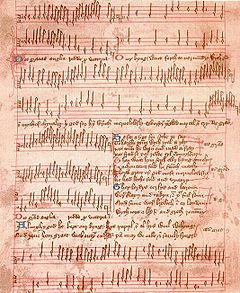
Agincourt Carol
Encyclopedia

Battle of Agincourt
The Battle of Agincourt was a major English victory against a numerically superior French army in the Hundred Years' War. The battle occurred on Friday, 25 October 1415 , near modern-day Azincourt, in northern France...
, in which the English army led by Henry V of England
Henry V of England
Henry V was King of England from 1413 until his death at the age of 35 in 1422. He was the second monarch belonging to the House of Lancaster....
defeated that of the French Charles VI
Charles VI of France
Charles VI , called the Beloved and the Mad , was the King of France from 1380 to 1422, as a member of the House of Valois. His bouts with madness, which seem to have begun in 1392, led to quarrels among the French royal family, which were exploited by the neighbouring powers of England and Burgundy...
in what is now the Pas-de-Calais region of France
France
The French Republic , The French Republic , The French Republic , (commonly known as France , is a unitary semi-presidential republic in Western Europe with several overseas territories and islands located on other continents and in the Indian, Pacific, and Atlantic oceans. Metropolitan France...
. The carol is one of thirteen on the Trinity Carol Roll, probably originating in East Anglia
East Anglia
East Anglia is a traditional name for a region of eastern England, named after an ancient Anglo-Saxon kingdom, the Kingdom of the East Angles. The Angles took their name from their homeland Angeln, in northern Germany. East Anglia initially consisted of Norfolk and Suffolk, but upon the marriage of...
, that has been held in the Wren Library
Wren Library
The Wren Library applies to at least two famous libraries in the UK that were designed by Sir Christopher Wren.*Wren Library, Cambridge*Wren Library, Lincoln...
of Trinity College, Cambridge
Trinity College, Cambridge
Trinity College is a constituent college of the University of Cambridge. Trinity has more members than any other college in Cambridge or Oxford, with around 700 undergraduates, 430 graduates, and over 170 Fellows...
since the 19th century.
The carol is featured in Laurence Olivier
Laurence Olivier
Laurence Kerr Olivier, Baron Olivier, OM was an English actor, director, and producer. He was one of the most famous and revered actors of the 20th century. He married three times, to fellow actors Jill Esmond, Vivien Leigh, and Joan Plowright...
's 1944 film Henry V
Henry V (1944 film)
Henry V is a 1944 film adaptation of William Shakespeare's play of the same name. The on-screen title is The Cronicle History of King Henry the Fift with His Battell Fought at Agincourt in France . It stars Laurence Olivier, who also directed. The play was adapted for the screen by Olivier, Dallas...
.
Lyrics
- Deo gratias Anglia redde pro victoria!
- [England, give thanks to God for victory!]
- Owre Kynge went forth to Normandy
- With grace and myght of chyvalry
- Ther God for hym wrought mervelusly;
- Wherefore Englonde may call and cry
- Chorus
- Deo gratias!
- Deo gratias Anglia redde pro victoria!
- He sette sege, forsothe to say,
- To HarfluHarfleur-Population:-Places of interest:* The church of St-Martin, dating from the fourteenth century.* The seventeenth century Hôtel de Ville .* Medieval ramparts * The fifteenth century museums of fishing and of archaeology and history....
towne with ryal aray; - That toune he wan and made afray
- That Fraunce shal rewe tyl domesday.
- Chorus
- Then went hym forth, owre king comely,
- In Agincourt feld he faught manly;
- Throw grace of God most marvelsuly,
- He had both feld and victory.
- Chorus
- Ther lordys, erles and barone
- Were slayne and taken and that full soon,
- Ans summe were broght into Lundone
- With joye and blisse and gret renone.
- Chorus
- Almighty God he keep owre kynge,
- His peple, and alle his well-wyllynge,
- And give them grace wythoute endyng;
- Then may we call and savely syng:
- Chorus
The pattern of a strophe
Strophe
A strophe forms the first part of the ode in Ancient Greek tragedy, followed by the antistrophe and epode. In its original Greek setting, "strophe, antistrophe and epode were a kind of stanza framed only for the music," as John Milton wrote in the preface to Samson Agonistes, with the strophe...
(verse) sung in English followed by a burden
Burden (music)
In music, the burden is an archaic term for the drone or bass in some musical instruments, and the pipe or part that plays it, such as a bagpipe or pedal point in an organ...
(chorus) in Latin followed a structure typical of the religious carols of the period.

